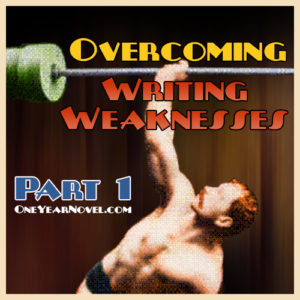Veteran Students on Overcoming Writing Weaknesses, Part 1
We asked several One Year Adventure Novel (OYAN) students to tell us what their biggest area of weakness is in writing, and what strategies they employ to overcome it.
This week, we feature eight different students and their responses. We hope their ideas for self-improvement will be useful to you!
Please add your own tips in the comments section!
…
Charlotte Anderson
Years with OYAN: 4
Weakness: Avoidance of conflict
“When I find a scene (or a page) that doesn’t have any conflict, I first evaluate if it has anything important, like necessary character development or important plot information. If it’s unnecessary, I cut the scene. If I need it, I look to see why there’s no conflict. Is my character getting the easy way out because I was writing lazily? Are my characters all getting along too well despite circumstances? After that I work to add some sort of mini disaster or irritation, or make the problem more difficult for my hero, or add tension between my characters.”
Jeremy Johnson
Years with OYAN: 7
Weakness: Not Writing (a.k.a. Procrastination)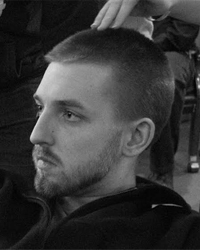
“The most effective way I have found to avoid procrastinating on my writing is to set aside a time, place, and physical state for writing. I block off time in my Google calendar and save a corner of the house to sit down in where I do nothing but write. It is hard to focus and find inspiration if I am sitting down late at night in the same chair that I sit in to check Facebook or watch YouTube videos, so I make sure my writing environment is not only distraction-free, but it has no association with distractions: My writing area is not loud, it is not high-traffic, my computer doesn’t have Internet access, I’m not within arm’s reach of the fridge, etc.”
Hillary Mitchell
Years with OYAN: 3
Weakness: Overly Emotional Writing Syndrome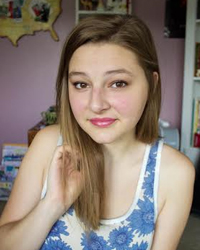
“As a short fiction writer/poet, I tend to lean towards highly emotional subject matter in my work. I love to utilize fragments and repetition to give a piece more emotion. While these are useful tools and definitely have a place in writing, I’ll often find that when I reread a piece it feels incomplete or disconnected. Because I tend to focus so much on whether or not I’m conveying emotion, sometimes I neglect to tell a story in its most whole form. I’ve found that the best way to remedy this is to write a piece with all of the emotion I feel and then leave it for at least 24 hours. When I am able to approach the work more critically and with less emotional investment, I reread and revise to decide where the emotion works and where less would be more.”
Jared Schmitz
Years with OYAN: 6
Weakness: Poor resolutions
“My stories start strong, but by the end I am often unable to weave together the disparate plot threads in a way that makes sense and is satisfying. This stems partly from inadequate planning and foresight, partly from poor knowledge of my characters’ desires and motivations, and partly from unexpected plot developments. In the past I’ve dealt with this issue by ignoring it and telling myself that I will fix everything in the second draft, but lately I’ve been devoting more time and effort to thinking about the end goal of the story and my ultimate reasons for writing it. I’ve also learned to listen to my storytelling instincts, which can tell me what resolutions must necessarily arise from the prior events of the story. Finally, I’ve gone back to a habit—abandoned in my early days as a writer—of doing more thorough outlining and introspection about my characters.”
Chelsea Beason
Years with OYAN: 3
Weakness: Losing Focus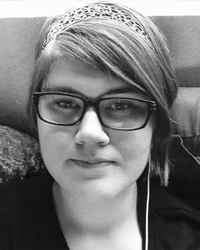
“I often don’t realize things aren’t making sense until I read the piece out loud. Even then, I am able to catch it much easier when another person is doing the reading. Once I have identified where it is or what it is that caused the confusion I step back and reevaluate what I was trying to get across. My problem is usually that I’m trying to cram too much information in at once, or am trying to convey multiple things happening at the same time. I find myself forgetting that readers can infer certain details based on what is said. By identifying the essentials I can begin cutting extraneous details and rearrange words and sentences to highlight what is important.”
Daniel Beals
Years with OYAN: 7
Weakness: Identical Characters
“So many times after finishing up a piece, I will read over it and discover something distressing: all my characters sound the same! They have the same voice, and the same personality: mine. They do have slight differences, of course, but they aren’t wonderful, unique, and deep individuals. They all blend together like spilled watercolors. How to work through it? Well, I don’t try to imagine I am my characters anymore. I base my characters’ personalities off of a friend, or family, and I pretend to be them rather than the character. Each character comes to life with great uniqueness, and personality because they haven’t all come from the same mind. They have a depth I could never create on my own. Because they become real people.”
Laura Beals
Years with OYAN: 7
Weakness: Procrastination
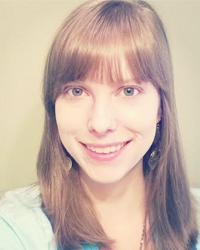
“I set aside a time during the day, whenever I’ll have at least an hour of uninterrupted time. Then I sit down and make myself write. I tend to get lost in development and delay writing for so long that I get bored with the story, which leads to more procrastination. Therefore when I do sit down in my scheduled time, I have to give myself permission to write badly, to just put words on paper and move the story forward, bored or not. Eventually as I write, the story becomes new again and slowly inspiration returns, but I have to keep writing to hold onto it. My key is write something every day, even if it’s just a paragraph or two. Paragraphs become pages, pages chapters and chapters become finished books.”
Miguel Flores
Years with OYAN: 6
Weakness: Using too many words to convey simple ideas
“I have to focus on what I want to say more than how I want to say it. Sometimes ‘profound’ one-liners hit me out of nowhere and I want to insert them into my writing. Some of them fit, most of them don’t. I attempt to write out the concept or scene as fully as I can, then read the entire chapter or story to see if it fits. If it doesn’t, I have to decide whether it’s worth editing or should be cut. If the idea fits, but the wording is too clever or lengthy for its own good, I decide what I really need to say and say it as clearly as possible—even if that means taking an entire paragraph and putting it into a five-word sentence. I take that writing and ask one or two close, honest friends to read it. Then I repeat the process.”
…
In our next blog post even more OYAN students get the chance to share their tactics for overcoming writing weaknesses!
What is your biggest struggle as a writer? Have you found any strategies that help you deal with it?
